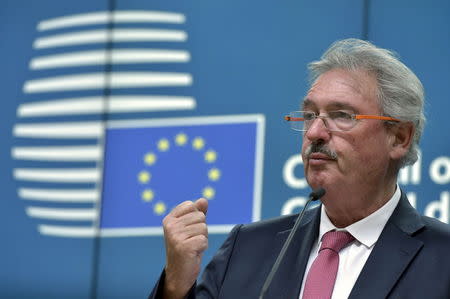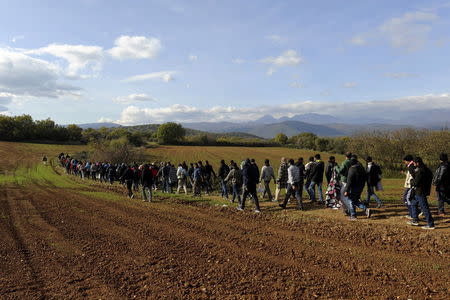Greece improving border control, cooperation - EU chair
By Alastair Macdonald BRUSSELS (Reuters) - Greek authorities are stepping up cooperation with EU agencies to better control migrants after threats from some allies to suspend Greece from Europe's Schengen passport-free zone, a senior EU official said. "There are still problems but there are improvements," said Jean Asselborn, the foreign minister of Luxembourg, who holds the rotating chairmanship of ministerial meetings on migration. In an interview with Reuters on Wednesday he rejected any suggestion that he delivered an ultimatum in Athens on Monday on the risk of suspension from Schengen and said he was encouraged that Greece would show progress in controlling its borders when EU interior ministers meet again in Brussels on Friday. "We have to make sure that people aren't talking in Brussels about Schengen and Greece, of pushing Greece out of Schengen," said Asselborn, referring to weekend comments by the Slovak prime minister and burgeoning discussion among EU diplomats in Brussels on suspending Athens' from Schengen. "That's something we must avoid at all costs and it's why, until Friday, we still have ... a few days to show that Greece is making progress," the veteran EU negotiator said, insisting he had put no "pressure" on officials in Athens on Monday. "I think it was constructive and we made progress," he said, condemning those who spoke of barring Greece, or of a "mini-Schengen" in the north, for destroying the "spirit" of Europe. "There's still a long way to go but we also have to encourage the Greek authorities to really push ahead and have confidence in the international and European institutions." "KICK IN THE GUTS" TO EUROPE The arrival via Turkey of hundreds of thousands of Syrian war refugees and others on Greek islands since Asselborn took over the chair of the council in July has poisoned relations among EU leaders as migrants have moved across their borders and prompted new frontier controls that are jeopardising Schengen's survival. Some argue that Athens' failure to manage its section of the bloc's external border means Greece should be cut off. Criticism has become particularly acute as Greece, already battered by a debt crisis that nearly saw it bounced out of the euro currency zone this year, has struggled to implement new EU measures agreed to document and fingerprint those arriving and to distribute refugees to other EU states in an organised way. Some officials and diplomats have complained that Athens has been slow to accept outside help, notably of foreign border guards from the EU's Frontex agency, to manage its frontiers. Asselborn said he had seen progress in managing reception for migrants on the islands off the Turkish coast and expected a final accord on cooperation with Frontex on the northern border, where migrants who have crossed Greece try to leave for Germany but now face new obstacles put in place by non-EU Macedonia. "We've been able to get rid of all the problems," he said of coordination between Greece and Frontex on the Macedonian border. "They promised me that by Friday this cooperation would be implemented." "We're ready to do all we can to ease the load on Greece's shoulders and in order to do that -- as I repeated several times to our Greek friends -- they have to understand that this cooperation with EU or U.N. agencies is fundamental." Asselborn was critical of the failure of other EU states to put up resources to help Greece, whether in terms of places to take in asylum seekers or providing border guards. Given problems with the scheme to redistribute refugees, it was, Asselborn said "almost irresponsible" to have floated last week a scheme to resettle hundreds of thousands direct from Turkey. He did not name German Chancellor Angela Merkel, who is a driving force behind such proposals on resettlement. He also had harsh words for discussion in the Netherlands and elsewhere of a greatly reduced passport-free zone: "We have to stop talking about these 'mini-Schengens'," he said. "If we want to destroy Europe, give it another kick in the guts so that Europe becomes something unrecognisable compared to our idea of solidarity, then we should keep up that talk." (Editing by Alison Williams)

 Yahoo News
Yahoo News 

